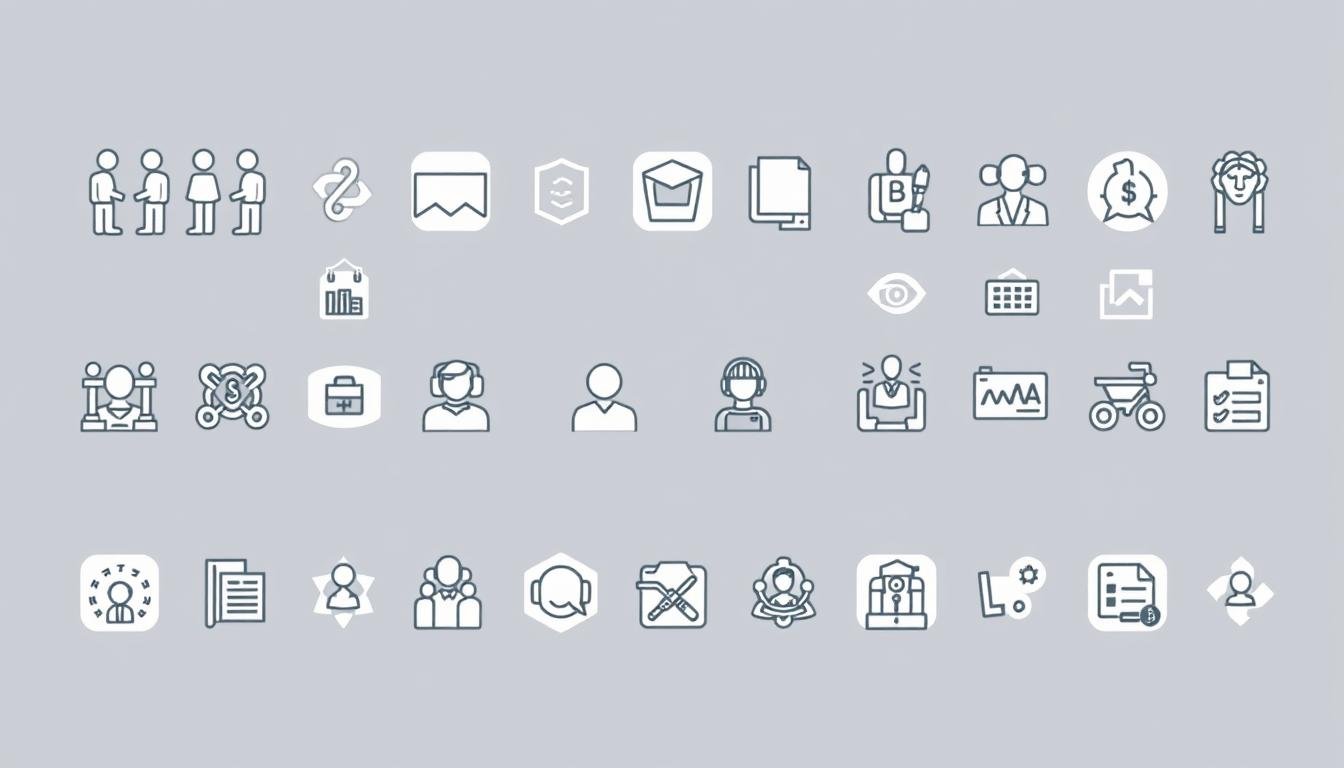CV Skills Examples: Boost Your Resume
Are you ready to boost your job search and get your dream job? The key is to show the right skills on your resume. But what skills do employers want, and how can you make your resume stand out?
In today’s job market, a well-made resume with the right skills can open doors. It doesn’t matter if you’re experienced or just starting. Knowing how to show your skills is key.
Employers want candidates with a variety of skills. They look for technical skills and soft skills. By adding the right skills to your resume, you can increase your chances of getting an interview and the job.
Let’s explore the world of resume skills. We’ll see how you can use your unique skills to make your resume shine. Whether you want to focus on hard skills, soft skills, or both, we have expert advice for you.
Key Takeaways
- Tailor your skills to match job descriptions for better results
- Balance hard skills and soft skills on your resume
- Highlight in-demand technical skills relevant to your industry
- Showcase soft skills that demonstrate your interpersonal abilities
- Use specific examples to quantify your skills and achievements
- Consider including language skills to stand out in the job market
- Regularly update your skills to stay competitive in your field
Understanding the Importance of Skills on Your CV
Your CV is a key tool to show off your skills and qualifications. Employers look for a mix of abilities that show you can do well in the job.
Why Skills Matter to Employers
Employers use Applicant Tracking Systems (ATS) to quickly scan resumes. Adding relevant skills from the job skills list boosts your chance of getting past this first check. Since hiring managers only spend a few minutes on each CV, a clear skills section is vital.
The Balance Between Hard and Soft Skills
A good CV shows both hard and soft skills. Hard skills like computer skills, data analysis, and marketing skills prove your technical skills. Soft skills like communication, teamwork, and problem-solving highlight your people skills.
| Hard Skills | Soft Skills |
|---|---|
| Computer Programming | Communication |
| Data Analysis | Teamwork |
| Marketing | Problem-solving |
| Writing | Emotional Intelligence |
How Skills Can Set You Apart
Unique skill mixes can make your CV stand out. For instance, combining technical skills with leadership skills shows you can do tasks and lead a team. Customize your skills for each job, focusing on the most relevant ones for the role.
“Personalizing the skills list for each job application can increase attention during the review process.”
Identifying Your Key Skills for a Powerful CV
Creating a standout CV begins with finding your core skills. Your work experience and career expertise are key to a strong resume. To find your main skills, look back at your professional and personal achievements.
First, check out job ads in your field. This shows you what employers look for. Then, think about your past jobs and projects. What special skills did you use? Also, include skills from volunteer work or hobbies.
Hiring managers quickly scan a resume, so make it count. Highlight skills that match the job. A blend of hard and soft skills can make you stand out.
“Your skills are your professional superpowers. Showcase them with pride and precision.”
Here’s a simple way to sort your skills:
| Hard Skills | Soft Skills |
|---|---|
| Software proficiency | Communication |
| Data analysis | Leadership |
| Languages | Problem-solving |
| Technical writing | Time management |
By choosing and showing your skills wisely, you’re not just listing them. You’re telling your professional story and what you can bring to the table.
Top Hard Skills to Showcase on Your Resume
Your talent summary should focus on technical skills and industry knowledge. Hard skills are key to standing out in today’s job market. Let’s look at the most wanted skills that can make your resume shine.
Technical Skills in High Demand
Employers look for strong technical skills. Skills like data analysis, programming languages, and digital marketing are in high demand. For example, Python is a must for software engineers, and SEO is crucial for marketing managers.
Industry-Specific Hard Skills
Each industry has its own set of skills. IT pros need to know about cybersecurity and cloud computing. Engineers should be good with CAD software. Marketing roles require skills in data analysis, project management, and tech knowledge.
Quantifiable Skills That Impress Recruiters
Recruiters like skills that can be measured. Certifications show your commitment to learning and your expertise in certain areas. Showing your skills in software like Adobe Creative Suite or Tableau can make you stand out.
| Industry | Top Hard Skills | Certifications |
|---|---|---|
| IT | Java, Web Development, Cybersecurity | AWS Certified Solutions Architect |
| Marketing | SEO, Data Analysis, Social Media Management | Google Analytics Certification |
| Design | Adobe Creative Suite, Typography, Color Theory | Adobe Certified Expert |
Remember, industries change fast. Keeping up with learning is crucial to stay relevant. Customize your skills to fit job descriptions and show off your unique mix of technical skills and industry knowledge.
Essential Soft Skills for Professional Success
Soft skills are key to doing well at work. In fact, 97% of employers think these skills are as crucial as hard skills. Let’s look at the top soft skills that can help you move up in your career.
Being good at working with others is a must. This means solving conflicts and making strong relationships. Being able to communicate clearly is also vital for sharing ideas well.
Leadership skills are highly sought after. They include solving problems, thinking strategically, and motivating teams. Being able to manage your time, adapt, and be creative is also important.
“Soft skills are the key to unlocking your full professional potential. They’re what set you apart in a competitive job market.”
Here’s a list of the top soft skills employers want:
| Skill Category | Specific Skills |
|---|---|
| Communication | Active listening, Public speaking, Writing |
| Leadership | Decision-making, Motivation, Delegation |
| Teamwork | Collaboration, Conflict resolution, Empathy |
| Adaptability | Flexibility, Resilience, Open-mindedness |
| Problem-solving | Critical thinking, Creativity, Analysis |
Showing these skills on your CV can really help you get your dream job. Put them into your work experience descriptions. Also, talk about times when you used these skills successfully.
Curriculum Vitae Skills Examples: Tailoring Your CV to the Job
Making a CV that fits the job you want is key to getting it. Customizing your resume makes you stand out and shows you’re serious about the job. Matching your skills with what the job needs can really help you get an interview.
Matching Skills to Job Descriptions
When you’re making your CV, look at the job ad closely. Use the same words and phrases from the ad to show off your skills. This makes your CV more likely to get past the automated checks and catch the eye of the person hiring.
Showcasing Transferable Skills
Point out skills that are useful in many jobs. If you’re applying for a teaching job, talk about your teaching and research experience. In the US and Canada, CVs for teaching jobs can be longer, so you can show more of your skills.
Highlighting Unique Skill Combinations
Show what makes you different by combining skills in a new way. For example, mix technical skills with good communication skills. Use the STAR method to give specific examples of how you’ve used these skills before.
| CV Section | Recommended Content |
|---|---|
| Contact Information | Full name, email, phone, location |
| Summary/Objective | Job title, years of experience, key accomplishments |
| Education | List degrees in reverse chronological order |
| Publications | Use bibliographic citations |
| Presentations | Include about five relevant presentations |
Remember, matching your skills with the job is crucial for a great CV. By making your CV fit each job, you show you understand the role and boost your chances of getting the job.
Effective Ways to Present Skills on Your CV
Making your CV stand out means using smart resume formatting and skill presentation. Begin by placing a dedicated skills section at the top. This spot is crucial as recruiters often look at each resume for just six seconds. Use bullet points or columns to make it easy to read and organize your CV.
Organize your skills into categories like technical, soft, and language skills. This makes it clear you have a wide range of abilities. Think about adding visual elements like skill bars to show how good you are at each skill. Also, remember that over 90% of companies use applicant tracking systems (ATS), so your CV should be easy for them to read with standard fonts and simple formatting.
Put key skills in your work experience section to show how they apply to the job. For example, if you work in healthcare, finance, or law, highlight your attention to detail. If you’re in tech, talk about your web development or Python skills. And don’t forget soft skills – 67% of HR managers look for strong soft skills in candidates. Include skills like communication, problem-solving, and leadership to complete your profile.
To really make your CV stand out, customize your skills for the job you want. This targeted approach, along with effective skill presentation, can greatly increase your chances of getting an interview. A well-done skills section is your key to standing out in a crowded job market.
Source Links
- 20 Best Skills to Put on Your Resume (With Examples)
- Skills to Put on a Resume Employers Will Actually Read (With Examples!)
- Top 300 Skills For Your Resume Recruiters Recommend and How to Use Them
- Top 20 Skills to Put on Your Resume
- 8 Impressive Skills To List On Your Resume
- Resumes and CVs : Graduate School
- 101 Essential Skills to Put on a Resume in 2024 [For Most Jobs]
- 7 Best Personal Skills for Your Resume (With Examples)
- What Are Hard Skills? 15 Hard Skills to Put on Your Resume
- 100+ Hard Skills To Boost Your Resume [Technical Skills, Examples, & More] | Teal
- Top Soft Skills for 2024 [90+ Examples for Your Resume]
- 11 Essential Soft Skills In 2024 (With Examples)
- Best 15 essential soft skills for your resume and profile
- How to Write a CV (Curriculum Vitae) in 2024 [31+ Examples]
- How to Tailor Your Resume to a Job Description (+Examples) | Teal
- Resume Skills: How to Write a Skills Section in 2024? [+Examples]
- 20 good skills to put on resume for new grads
- 101+ top skills on a CV | Examples & tips for every job







